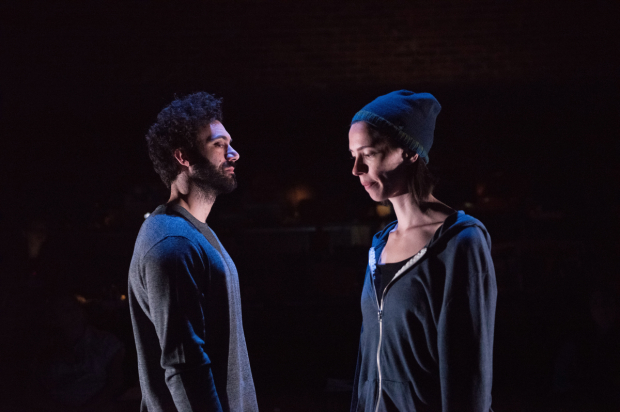Animal

(© Ahron R. Foster)
The last character Rebecca Hall played on a New York stage was driven to murder and madness after enduring the constraints imposed on women in the early 20th century. Hints of Sophie Treadwell's Machinal (in which Hall made her Broadway debut in 2013) are reflected in Clare Lizzimore's unrelenting pressure cooker of a play, Animal, which Hall now leads at the Atlantic Theater's Stage 2 in its New York premiere. However, as the respective titles suggest, her new cage is less the grinding gears of a societal machine (although there are elements of that as well) and more the uncontrollable physical mechanisms to which her character is left helpless.
Helmed by Gaye Taylor Upchurch with an unobtrusive but calculated hand, the plot of Animal is shrouded in mystery— as it should remain for anyone who wants an authentic experience of its emotional ride. But what we can see from the start is an internal hurricane wreaking havoc on the mind of our central character, Rachel (Hall). After an opening flashback to a tender moment between Rachel and who we learn is her husband Tom (played by her real-life husband, Morgan Spector), we meet a far more defensive Rachel mid-therapy session with Stephen (an unflappably clinical Greg Keller).
Rachel's sarcastic shields are up, but she eventually confesses to severe insomnia, while her perpetual outfit of gray sweats and knit beanie suggest a person who perhaps is behind on bathing as well as other forms of self-care (an informative costume designed by Sarah J.Holden). Her grasp on life is slipping away, and yet she still has the wherewithal to call her therapist on the carpet for some misogynistic comments (he evaluates her mental stability by asking about her cooking habits and suggests a bubble bath and face mask as a relaxing exercise). The sharp, witty Rachel clearly still exists (thanks to some brilliantly funny dialogue by Lizzimore), but she's being tossed around by some invisible, internal force about which we are left as frustratingly ignorant.
Hall is astonishing in her ability to convey the subtleties of this inner tug-of-war. Every move springs from a defined core character, and yet, nothing at all is remotely anchored in any stable existence. But rather than collapsing into ball of frantic confusion, she moves through each scene with the crafted intention of someone carefully maneuvering an obstacle course of invisible knives and broken glass (made even more treacherous by the play's intentionally sparse set design by Rachel Hauck and reality-adjacent lighting design by Bradley King).
Occasionally this tenuous course is interrupted by unwelcome guests, including a seductive intruder named Dan (an appropriately animalistic performance by David Pegram) who makes her contemplate infidelity — especially considering her constant suffocation as an ex-career woman who now spends her days at home taking care of her husband Tom's dependent mother (played by the heartbreaking Kristin Griffith).
Without knowing the circumstances behind this arrangement, nor often the distinction between reality and imagination (the confident young Fina Strazza appears to Rachel as her therapist Stephen in one scene), it's impossible to determine whether Tom is a nurturer or a captor. As such, Spector leaves both doors wide open. He stoically absorbs his wife's fits of rage, though never surrendering the silent power he holds like a well-kept secret. The role itself is a rather passive one, and yet, being the commanding performer that he is, Spector never has anything less than full control over every situation — which in certain contexts is comforting, and in others, completely terrifying.
Considering the skill with which we're kept off balance through the majority of the 85-minute play, it resolves incongruously neatly, and with a surprisingly pointed diagnosis. The overly explanatory ending takes away some of the raw punch, which, up to this point, has allowed Animal to live up to its name. However, if all for the sake of bringing an underexplored facet of woman nature to the stage, a moment of human clarity is forgiven.











